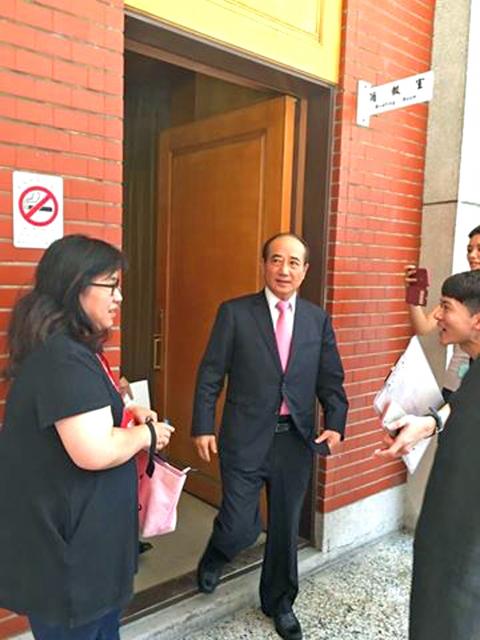Chinese Nationalist Party (KMT) Legislator Wang Jin-pyng (王金平) yesterday confirmed that he had been sounded out about heading the Straits Exchange Foundation (SEF) by people sent by President Tsai Ing-wen (蔡英文), but said it was “a long time ago.”
However, in March, the former legislative speaker denied that such an offer had been made and dismissed as “rumor” a report that said Tsai considered him a good candidate for the post and had offered him the job.
Asked yesterday about the possibility of him taking up the job, Wang said that he could not comment “because the president did not bring up the issue personally.”

Photo: Chiu Yen-ling, Taipei Times
Pressed on whether he had been asked by someone sent by Tsai, Wang paused before saying: “[I was asked] a long time ago. I said we would see how the cross-strait relationship goes.”
When asked how he felt now, Wang said there was no need to talk about his position, “because there have not been any formal talks over the issue.”
Asked if he would be willing to consider an offer if there were formal talks, he said: “We will see by that time.”
The KMT hinted that it might take disciplinary action against Wang if he were to join Tsai’s administration.
KMT caucus secretary-general Lin Te-fu (林德福) said Wang would have to quit as legislator-at-large if he accepted a job offer.
“It is simply not possible for an SEF chairman, who would be questioned at the legislature, to double as a legislator-at-large,” Lin said. This is “what the law and the institution stipulates.”
Asked whether Wang’s party membership rights might be suspended, Lin said the party’s regulations would be followed.
The Chinese-language Apple Daily on Monday cited an unnamed “high-ranking KMT official” as saying that if Wang became SEF chairman, he would be disciplined the same way Presidential Office Secretary-General Lin Bih-jaw (林碧炤), Minister of Foreign Affairs David Lee (李大維), Minister of National Defense Feng Shih-kuan (馮世寬) and Veterans Affairs Council Director Lee Shying-jow (李翔宙) were.
All four saw their KMT membership rights suspended after they joined the Cabinet without notifying KMT headquarters.
Asked about the KMT stance that he could not serve as SEF chairman and a KMT legislator-at-large, Wang said he was not clear about the report, but that “past examples could be looked into.”
While People First Party (PFP) Chairman James Soong (宋楚瑜) has also been cited as a possible candidate to lead the SEF, PFP caucus convener Lee Hung-chun (李鴻鈞) said that the issue had not been discussed in the two meetings Tsai held with Soong.
The emphasis should be on the Tsai administration’s cross-strait policy, not on the foundation’s leadership, Lee said.
“If the two sides [of the Taiwan Strait] have no common ground, it makes no difference [who heads the SEF],” Lee said.

DAREDEVIL: Honnold said it had always been a dream of his to climb Taipei 101, while a Netflix producer said the skyscraper was ‘a real icon of this country’ US climber Alex Honnold yesterday took on Taiwan’s tallest building, becoming the first person to scale Taipei 101 without a rope, harness or safety net. Hundreds of spectators gathered at the base of the 101-story skyscraper to watch Honnold, 40, embark on his daredevil feat, which was also broadcast live on Netflix. Dressed in a red T-shirt and yellow custom-made climbing shoes, Honnold swiftly moved up the southeast face of the glass and steel building. At one point, he stepped onto a platform midway up to wave down at fans and onlookers who were taking photos. People watching from inside

A Vietnamese migrant worker yesterday won NT$12 million (US$379,627) on a Lunar New Year scratch card in Kaohsiung as part of Taiwan Lottery Co’s (台灣彩券) “NT$12 Million Grand Fortune” (1200萬大吉利) game. The man was the first top-prize winner of the new game launched on Jan. 6 to mark the Lunar New Year. Three Vietnamese migrant workers visited a Taiwan Lottery shop on Xinyue Street in Kaohsiung’s Gangshan District (崗山), a store representative said. The player bought multiple tickets and, after winning nothing, held the final lottery ticket in one hand and rubbed the store’s statue of the Maitreya Buddha’s belly with the other,

‘NATO-PLUS’: ‘Our strategic partners in the Indo-Pacific are facing increasing aggression by the Chinese Communist Party,’ US Representative Rob Wittman said The US House of Representatives on Monday released its version of the Consolidated Appropriations Act, which includes US$1.15 billion to support security cooperation with Taiwan. The omnibus act, covering US$1.2 trillion of spending, allocates US$1 billion for the Taiwan Security Cooperation Initiative, as well as US$150 million for the replacement of defense articles and reimbursement of defense services provided to Taiwan. The fund allocations were based on the US National Defense Authorization Act for fiscal 2026 that was passed by the US Congress last month and authorized up to US$1 billion to the US Defense Security Cooperation Agency in support of the

‘COMMITTED TO DETERRENCE’: Washington would stand by its allies, but it can only help as much as countries help themselves, Raymond Greene said The US is committed to deterrence in the first island chain, but it should not bear the burden alone, as “freedom is not free,” American Institute in Taiwan Director Raymond Greene said in a speech at the Institute for National Defense and Security Research’s “Strengthening Resilience: Defense as the Engine of Development” seminar in Taipei yesterday. In the speech, titled “Investing Together and a Secure and Prosperous Future,” Greene highlighted the contributions of US President Donald Trump’s administration to Taiwan’s defense efforts, including the establishment of supply chains for drones and autonomous systems, offers of security assistance and the expansion of